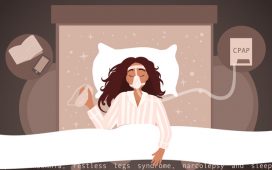When it comes to self-care, a disconnect between physicians and patients has gone viral – or bacterial, if you prefer. The story has a fabulous start but a muddy ending that deserves everyone’s attention.
Here’s the scoop.
- More than 9 in 10 physicians (96 percent) believe that self-care should be considered an essential part of overall health.
- In almost full agreement, 88 percent of patients consider self-care a key part of overall health.
If only we could end the story here.
However, it turns out that 75 percent of patients say they haven’t discussed self-care with their physician within the last two years. One significant reason for this time warp is that a whopping 46 percent of docs don’t think patients are interested in discussing self-care. Interesting – because the majority of patients (72 percent) say they are interested in discussing self-care with their healthcare provider.
These stats, and many more, come from a new survey, released in July 2019 and conducted by The Harris Poll on behalf of Samueli Integrative Health Programs.(1) The survey involved more than 1,000 U.S. adults ages 18 and older and more than 300 family medicine and internal medicine physicians.
“The reason we chose to look specifically at self-care is because we know that 80 percent of what causes chronic disease lies outside the realm of most medical treatment,” explains Wayne Jonas, MD, Executive Director of Samueli Integrative Health Programs, practicing family physician, and Professor of Medicine at Georgetown University and The Uniformed Services University of the Health Sciences. “Encouraging patients to incorporate self-care practices into their daily lives is not only important for their health, it’s a critical component in reducing our country’s chronic disease burden. In order to truly make a difference in the health of our patients, the future of primary care – indeed all healthcare – must address the patient as a whole person and take an integrative health approach to guide and support healthy behaviors outside the clinic.”
What Is Self-Care?
With everyone applauding the benefits of self-care yet far too few discussing the topic, Dr. Jonas proposes to sync up physician and patient perspectives by first defining self-care – so everyone’s on the same page.
Drilling down to specifics, physicians and patients agree that exercise (94 percent physicians, 71 percent patients), eating healthy foods, (93 percent physicians, 74 percent patients) and getting enough sleep (92 percent physicians, 73 percent patients) qualify as self-care.
Patients Want More
It appears that the majority of patients (57 percent) would like to broaden the definition of self-care to encompass physical, mental, emotional, social, and spiritual needs. Here’s what patients say:
- 55 percent want conversations about how self-care might affect their life goals – a point Dr. Jonas emphasizes. “We know that what matters most in your life actually drives motivation and behavior change for patients. So this connect is important.”
- 66 percent wish their physician shared more resources on self-care, such as nutritionists, health coaches, social workers, and other healthcare professionals.
- 65 percent want their physician to be involved in all aspects of their health management, including mental health and lifestyle behaviors.
- 64 percent would like complementary and alternative therapies incorporated into their health care, such as yoga, acupuncture, massage, and meditation. “These topics are not normally discussed as part of medical care,” Dr. Jonas says. And they should be, he adds, since these are self-care practices that patients can take home.
Here’s another disconnect that Dr. Jonas stresses: “While nearly all physicians – 97 percent – say they think their patients would benefit from self-care, only 33 percent of physicians actually discuss self-care with patients. That’s a big gap. And it turns out that even when physicians do talk about self-care with patients, topics are usually focused on diet, exercise, and substance abuse. Those are important factors in health and well being, no doubt, but by no means do they cover all the self-care needs a patient might have.”
Think Positive – It’s Good For Your Health
Looking beyond the disconnects for a moment, Dr. Jonas returns to a positive point worth repeating. “Self-care is high on everybody’s list. That’s meaningful. It dispels every myth that self-care is peripheral and not really worthy of our attention in the clinic.”
As for viable steps to help close the gap between patient and physician perspectives on self-care, Dr. Jonas has suggestions. First we need to clear up misconceptions. Patients want to talk about self-care with their physicians; physicians want to talk about self-care with their patients; so let’s do it!
Next we need to strike down or work around barriers that prevent physician/patient communication about self-care. For instance, the study says, two barriers in particular are physician burnout and patient guilt. To read up on ways to knock down these barriers, stay tuned for Part II: Building A Strong Physician-Patient Connection On Self-Care.
Resource
1) Why is Self-Care So Important for Health? (2019, August 08).







